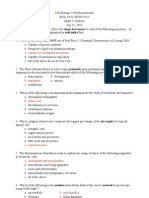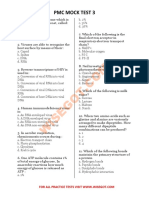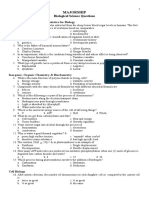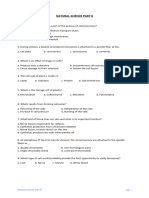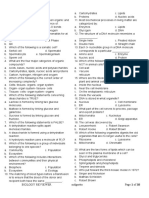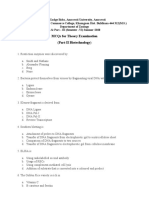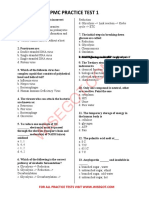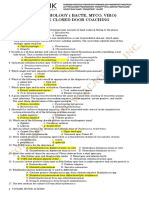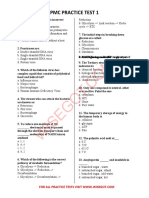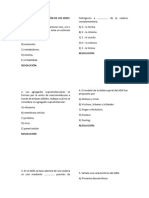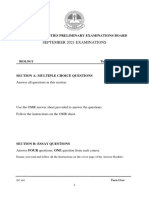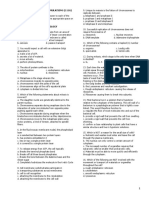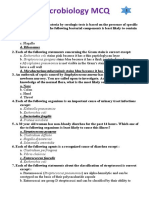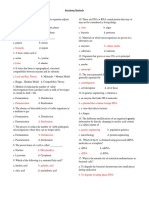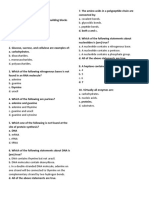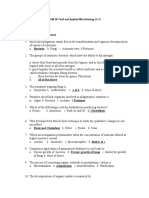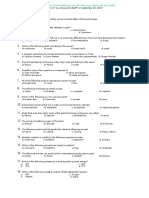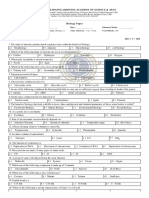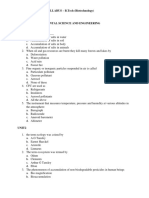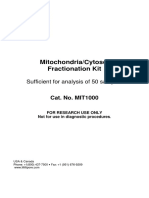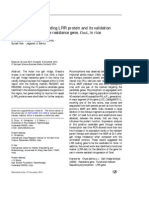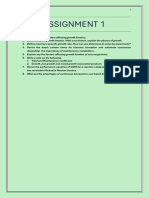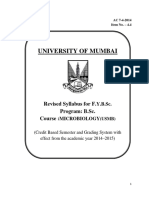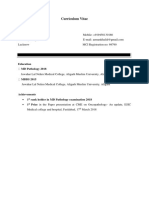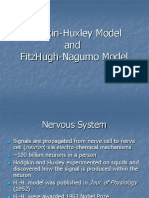0 ratings0% found this document useful (0 votes)
35 viewsMicrobiology Model QP PG 2021-22
Microbiology Model QP PG 2021-22
Uploaded by
gopi00871. The document appears to be a model exam for a course in Microbiology. It contains 3 sections - Section A with 20 multiple choice questions, Section B with 5 short answer questions, and Section C with 3 long answer questions.
2. The exam covers topics in microbiology including bacterial culture methods, antimicrobial resistance, microbial classification and identification, viruses, fungi, archaea, bacterial diseases, and commercially important microbes.
3. Students are tested on their knowledge of specific microorganisms, microbial processes like the sulfur cycle, and interactions like quorum sensing.
Copyright:
© All Rights Reserved
Available Formats
Download as DOCX, PDF, TXT or read online from Scribd
Microbiology Model QP PG 2021-22
Microbiology Model QP PG 2021-22
Uploaded by
gopi00870 ratings0% found this document useful (0 votes)
35 views3 pages1. The document appears to be a model exam for a course in Microbiology. It contains 3 sections - Section A with 20 multiple choice questions, Section B with 5 short answer questions, and Section C with 3 long answer questions.
2. The exam covers topics in microbiology including bacterial culture methods, antimicrobial resistance, microbial classification and identification, viruses, fungi, archaea, bacterial diseases, and commercially important microbes.
3. Students are tested on their knowledge of specific microorganisms, microbial processes like the sulfur cycle, and interactions like quorum sensing.
Original Description:
Model question paper
Copyright
© © All Rights Reserved
Available Formats
DOCX, PDF, TXT or read online from Scribd
Share this document
Did you find this document useful?
Is this content inappropriate?
1. The document appears to be a model exam for a course in Microbiology. It contains 3 sections - Section A with 20 multiple choice questions, Section B with 5 short answer questions, and Section C with 3 long answer questions.
2. The exam covers topics in microbiology including bacterial culture methods, antimicrobial resistance, microbial classification and identification, viruses, fungi, archaea, bacterial diseases, and commercially important microbes.
3. Students are tested on their knowledge of specific microorganisms, microbial processes like the sulfur cycle, and interactions like quorum sensing.
Copyright:
© All Rights Reserved
Available Formats
Download as DOCX, PDF, TXT or read online from Scribd
Download as docx, pdf, or txt
0 ratings0% found this document useful (0 votes)
35 views3 pagesMicrobiology Model QP PG 2021-22
Microbiology Model QP PG 2021-22
Uploaded by
gopi00871. The document appears to be a model exam for a course in Microbiology. It contains 3 sections - Section A with 20 multiple choice questions, Section B with 5 short answer questions, and Section C with 3 long answer questions.
2. The exam covers topics in microbiology including bacterial culture methods, antimicrobial resistance, microbial classification and identification, viruses, fungi, archaea, bacterial diseases, and commercially important microbes.
3. Students are tested on their knowledge of specific microorganisms, microbial processes like the sulfur cycle, and interactions like quorum sensing.
Copyright:
© All Rights Reserved
Available Formats
Download as DOCX, PDF, TXT or read online from Scribd
Download as docx, pdf, or txt
You are on page 1of 3
VIVEKANANDHA COLLEGE OF ARTS AND SCIENCES FOR WOMEN
(AUTONOMOUS) ELAYAMPALAYAM, TIRUCHENGODE
DEPARTMENT OF BIOTECHNOLOGY - I M.Sc. BIOTECHNOLOGY
ODD SEMESTER – MICROBIOLOGY
MODEL EXAMINATION – FEB 2022
NAME OF THE COURSE: COURSE CODE: PG DURATION: 3 Hrs
MICROBIOLOGY
MAX MARKS: 75 20P1BTC04 Date: 03/03/2022
SECTION – A (1 X 20 = 20 MARKS) ANSWER ALL THE QUESTIONS
1. Fleming discovers lysozyme in-------------
a. 1931 b. 1911 c. 1921 d. 1941
2. Who discovered the bacteria that cause cholera?
a. Pierre b. Robert Koch c. Louis Pasteur d. Rudolf
Berthelot Virchow
3. Microbes use inorganic compounds as electron donor is called?
a. Chemotrophs b. Organotrophs c. Lithotrophs d. Phototrophs
4. Cell wall biosynthesis is inhibited by antibiotics by inhibiting-----------
a. LPS b. Cellulose c. Peptidoglyca d. proteins
n
5. Which of the following is not found in the kingdom Monera?
a. Organelles b. Organized cell c. Ability to d. Ability to use
structure reproduce energy
6. % Similarity (%S) of each strain to every other strain is calculated by which method?
a. Intuitive b. Numerical c. Genetic d. DNA
Method Taxonomy Relatedness homology
experiments
7. Which of the following is a substitute for crystal violet in gram’s staining procedure?
a. Methylene b. Bromocresol c. Safranin d. Phenolpthalen
blue green e
8. Which of the following is not used to determine DNA relatedness in the phylogenetic
system?
a. Thermal b. Genome size c. GC content d. Amino acid
stability of sequences
related DNA
9. Pseudo-murein is present in cell wall of --------
a. Streptococci b. Staphylococci c. Methanococci d. Micrococci
10. Which bacteria have an unusual capsule among the following?
a. Haemophilus b. Klebsiella c. Streptococcu d. Bacillus
influenzae pneumoniae s anthracis
pneumoniae
11. What does a viral DNA becomes after being associated with the bacterial
chromosome?
a. Gene b. Prophage c. Plasmid d. plaque
12. What is the shape of the nucleoid of poxviruses?
a. Circular b. Brick-shaped c. Irregular d. Dumbbell-
shaped
13. Rancidity in spoiled foods is due to-------
a. Lipolytic b. Proteolytic c. Toxigenic d. Saccharolytic
organisms organisms microbes microbes
14. In most of purple bacteria, the light harvesting centers are
a. B 850 & Fe-S b. B 850 & B 875 c. B 845 & B d. B 850 & B830
875
15. Hetrolactic acid bacteria produce------
a. Lactic acid b. Lactic acid + c. Lactic acid + d. Lactic acid +
only H2O + CO2 CO2 alchohol +
CO2
16. The free floating algae are known as---------
a. Phytoplankins b. Benthons c. Sea weeds d. None of these
17. Fixation of atmospheric nitrogen is by means of
a. Biological b. Lightining c. Ultraviolet d. All the above
process light
18. Role of bacteria in carbon cycle is-------
a. Photosynthesi b. Chemosynthesi c. Breakdown d. Assimilation
s s of organic of nitrogen
compounds compounds
19. Sulphur oxidizing bacteria is--------
a. Alcaligenes b. Pseudomonas c. Thiobacillus d. None of these
20. Quorum sensing is used by bacterial cells to determine which of the following?
a. the size of the b. the availability c. the speed of d. the density of
population of nutrients water flow the population
SECTION – B (5 X 5 = 25 MARKS) ANSWER ALL THE QUESTIONS
21. A) Explain about bacterial culture methods.
B) Write a short note on antimicrobial resistance.
22. A) Describe the criteria for classification of microbes.
B) Write a short note on methods of microbial identification.
23. A) Write a short note on Candidasis.
B) Explain the cultivation methods for viruses.
24. A) Explain the significance of Cyanobacteria and Mycobacterium species.
B) Write a short note on general characteristics of Archaea.
25. A) Explain about sulphur cycle with examples.
B) Brief about quorum sensing.
SECTION – C (3 X 10 = 30 MARKS) ANSWER ALL THE QUESTIONS
26. Give detailed account on sterilization methods.
27. Write a detailed account on classification of viruses with typical examples.
28. Write a detailed note on microbial diseases with examples in each class.
29. Give a detailed note on two commercially important microbes with relevant process.
30. Explain the microbial interaction with classical examples.
You might also like
- Cell Biology Exam 1 ReaDocument7 pagesCell Biology Exam 1 ReaCsa At Uh100% (3)
- PMC Mock Test 3Document18 pagesPMC Mock Test 3Musharaf RehmanNo ratings yet
- PMC Mock Test 3Document18 pagesPMC Mock Test 3hmdNo ratings yet
- Biology Remedial ExamDocument8 pagesBiology Remedial ExamDesale chaliNo ratings yet
- Questions-Biological Science DavaoDocument10 pagesQuestions-Biological Science DavaoMARY ANN TIONGSONNo ratings yet
- bt301 Full Book McqsDocument31 pagesbt301 Full Book McqsAarish AliNo ratings yet
- General Biology - Comprehensive ExaminationDocument3 pagesGeneral Biology - Comprehensive ExaminationDiana Jean Alo-adNo ratings yet
- PMC Practice Test 05 2022Document11 pagesPMC Practice Test 05 2022Farhan GhanghroNo ratings yet
- Cell Structure and FunctionDocument4 pagesCell Structure and FunctionRahila AkramNo ratings yet
- 8th Class Biology Paper MCQS TypeDocument3 pages8th Class Biology Paper MCQS Typemukhtar ullahNo ratings yet
- Natural Science Part 8 R 50Document6 pagesNatural Science Part 8 R 50Jojimar JulianNo ratings yet
- Biology Reviewer QuestionsDocument10 pagesBiology Reviewer QuestionsMICHELLE DE GUZMAN SOTTONo ratings yet
- Admission Test-Fall 2017Document9 pagesAdmission Test-Fall 2017Ihsaan gulzarNo ratings yet
- Reviewer in PHA611: Pharmaceutical Botany With Taxonomy Multiple ChoicesDocument8 pagesReviewer in PHA611: Pharmaceutical Botany With Taxonomy Multiple ChoicesEza SongahidNo ratings yet
- B.SC - III Zoology (GBK) - 2Document8 pagesB.SC - III Zoology (GBK) - 2april0% (1)
- Kips Nmdcat (P) FLP-5Document40 pagesKips Nmdcat (P) FLP-5The exposerNo ratings yet
- Entrance 2017Document20 pagesEntrance 2017Ipsita NagNo ratings yet
- PMC Mock Test 1 by WisegotDocument17 pagesPMC Mock Test 1 by WisegotblahNo ratings yet
- Science G12 DappDocument10 pagesScience G12 DappChester Austin Reese Maslog Jr.No ratings yet
- Mock Test 2 by WisegotDocument18 pagesMock Test 2 by WisegotTasawar Hussain DayoNo ratings yet
- Agm - 301 2007 QBDocument34 pagesAgm - 301 2007 QBAgri SpotNo ratings yet
- Nmat Mock Exam For BioDocument7 pagesNmat Mock Exam For BioMDreamerNo ratings yet
- MBIO1010 Mid-Term #1 PracticeDocument7 pagesMBIO1010 Mid-Term #1 PracticeGiulia CostantiniNo ratings yet
- MicrobiologyDocument16 pagesMicrobiologymassom100% (1)
- National Standard Examination in Biology 2009-2010: Indian Association of Teachers in Biological SciencesDocument21 pagesNational Standard Examination in Biology 2009-2010: Indian Association of Teachers in Biological SciencespreetsyadNo ratings yet
- 11th Bio - Botany One Mark Question Bank With Answer Key English Medium 2022-23Document8 pages11th Bio - Botany One Mark Question Bank With Answer Key English Medium 2022-23Cute Sweet100% (2)
- Free Closed Door Coaching Prof Arconado - Microbiology - 200 Items Key PDFDocument14 pagesFree Closed Door Coaching Prof Arconado - Microbiology - 200 Items Key PDFAnne MorenoNo ratings yet
- PMC Paper 2022 PracticeDocument130 pagesPMC Paper 2022 PracticeMusharaf RehmanNo ratings yet
- 67-11th Bio-Botany EM - One Marks Questions With Keys - English Medium PDF DownloadDocument8 pages67-11th Bio-Botany EM - One Marks Questions With Keys - English Medium PDF Downloadsheikabdulpari.nNo ratings yet
- A. Chlorophyll ADocument16 pagesA. Chlorophyll AKishor SarodeNo ratings yet
- TN Sinh 2Document23 pagesTN Sinh 2Lê Hoàng Kim KhánhNo ratings yet
- Repaso BiologíaDocument6 pagesRepaso BiologíaPedro Miranda YucraNo ratings yet
- 2021 Biology - MCQ & EssayDocument12 pages2021 Biology - MCQ & EssayMiracle IlodigweNo ratings yet
- Mock 2 IRDocument3 pagesMock 2 IRWendell Kim LlanetaNo ratings yet
- Mock 1 Bio Sample QuestionsaDocument3 pagesMock 1 Bio Sample QuestionsaJohn GreenNo ratings yet
- Mock 1 Bio Sample QuestionsbDocument3 pagesMock 1 Bio Sample QuestionsbJohn GreenNo ratings yet
- Part 5 Bio ReviewerDocument5 pagesPart 5 Bio ReviewerChester Kim DiscarNo ratings yet
- DR Ali Alanbaki MCQ MicrobiologyDocument14 pagesDR Ali Alanbaki MCQ MicrobiologyDr. noor taherNo ratings yet
- Bio 1st Year 1 To 7 (Smart)Document2 pagesBio 1st Year 1 To 7 (Smart)itstariqgujjarNo ratings yet
- BiochemDocument3 pagesBiochemVaanNo ratings yet
- Micropara-Final ExamDocument6 pagesMicropara-Final ExamAughty H. JuanzoNo ratings yet
- QuestionsDocument4 pagesQuestionsCatherine CarpioNo ratings yet
- Part A I. Choose The Correct Answer: AGM 301 Soil and Applied Microbiology (1+1)Document30 pagesPart A I. Choose The Correct Answer: AGM 301 Soil and Applied Microbiology (1+1)shubham100% (6)
- 02 FLP-2 Final Session Paper-2 (Student Copy)Document14 pages02 FLP-2 Final Session Paper-2 (Student Copy)FIRE WOLFNo ratings yet
- Radioloy 2Document25 pagesRadioloy 2Asif NewazNo ratings yet
- Bio Practice TestDocument9 pagesBio Practice TesthazalNo ratings yet
- AKU EB - Biology - XI - Paper I - 2013 - MayDocument8 pagesAKU EB - Biology - XI - Paper I - 2013 - MayAnas Faheem100% (1)
- BIO K101 Final Exam AnswersDocument26 pagesBIO K101 Final Exam Answersjade7640No ratings yet
- MedSCi Midterm Practice Biomembranes MCQDocument5 pagesMedSCi Midterm Practice Biomembranes MCQPat FerrerNo ratings yet
- General Science BDocument4 pagesGeneral Science BmaryjeandolinoNo ratings yet
- Biological Science Major Test Item ADocument9 pagesBiological Science Major Test Item ALemmy Constantino DulnuanNo ratings yet
- Cell Structure & Functions Unit MOCKDocument72 pagesCell Structure & Functions Unit MOCKdeveshrbagadeNo ratings yet
- Biology PaperDocument9 pagesBiology PaperUsama ZafarNo ratings yet
- BIO 275 - Chapter 3 and 4 QuestionsDocument3 pagesBIO 275 - Chapter 3 and 4 QuestionsLindsey StilleyNo ratings yet
- QPDocument73 pagesQPEnd Semester Theory Exams SathyabamaNo ratings yet
- (Biol 12) 200 MCQ On Microorganisms + AnswersDocument23 pages(Biol 12) 200 MCQ On Microorganisms + Answersjemal12174No ratings yet
- PMC Practice Test 03 2022Document11 pagesPMC Practice Test 03 2022Farhan GhanghroNo ratings yet
- Tổng hợp lại câu hỏi chapter 1-27Document53 pagesTổng hợp lại câu hỏi chapter 1-27Đan TâmNo ratings yet
- Model Question in Microbiology Department of MicrobiologyDocument39 pagesModel Question in Microbiology Department of MicrobiologySujata DiveNo ratings yet
- Mitochondria/Cytosol Fractionation Kit: Sufficient For Analysis of 50 SamplesDocument8 pagesMitochondria/Cytosol Fractionation Kit: Sufficient For Analysis of 50 SamplesMariano PerezNo ratings yet
- GM4 PaperDocument11 pagesGM4 PaperBhaskar BhaskarNo ratings yet
- Whooping Cough 2020 Nov PDocument15 pagesWhooping Cough 2020 Nov PHUỲNH QUỐC KHÁNHNo ratings yet
- 2. Exam 2 Sample Questions (Жагупаров)Document3 pages2. Exam 2 Sample Questions (Жагупаров)respect_6opicNo ratings yet
- AssignmentDocument3 pagesAssignmentVarun JhaNo ratings yet
- Biochemistry Imp Questions - DR - VISHWA MEDICAL COACHING, WHASTSAPP MEDICAL HELPLINE - +919930788955Document9 pagesBiochemistry Imp Questions - DR - VISHWA MEDICAL COACHING, WHASTSAPP MEDICAL HELPLINE - +919930788955Sarfraz Ahmad AhmadNo ratings yet
- ListOfBooks PDFDocument235 pagesListOfBooks PDFDharmik Gadhavi50% (2)
- Faculty Research InterestsDocument9 pagesFaculty Research InterestsAntiMageNo ratings yet
- Date 01/dec/2021 04:33AM 30/nov/21 05:17PM Unit Bio Ref IntervalDocument2 pagesDate 01/dec/2021 04:33AM 30/nov/21 05:17PM Unit Bio Ref IntervalSaurabh PuriNo ratings yet
- Whole Genome Sequencing (WGS) - PulseNet Methods - PulseNet - CDCDocument9 pagesWhole Genome Sequencing (WGS) - PulseNet Methods - PulseNet - CDCcylon3No ratings yet
- Reviewer in General Biology 1Document3 pagesReviewer in General Biology 1Angela DudasNo ratings yet
- بايو تخدير مرحلة أولى محاضرة1Document8 pagesبايو تخدير مرحلة أولى محاضرة1ammarNo ratings yet
- Protein Isolation and IdentificationDocument31 pagesProtein Isolation and IdentificationtimilehinfalemuNo ratings yet
- Animal Nutrition - CrosswordDocument2 pagesAnimal Nutrition - CrosswordzeqialNo ratings yet
- 4.4 Micro BiologyDocument17 pages4.4 Micro BiologyMansi PatilNo ratings yet
- Problems and Prospects of Genetically Modified Organisms in Agricultural ProductionDocument36 pagesProblems and Prospects of Genetically Modified Organisms in Agricultural ProductionMajestyNo ratings yet
- 4 Global Diversity Orians&GroomDocument36 pages4 Global Diversity Orians&GroomestefaniacabezasNo ratings yet
- BloodDocument24 pagesBloodapi-310193189No ratings yet
- The Variant Call Format and Vcftools: ExampleDocument1 pageThe Variant Call Format and Vcftools: ExampleAle LuNo ratings yet
- Etiopathogenesis of PsoriasisDocument62 pagesEtiopathogenesis of PsoriasisGagan SinghNo ratings yet
- Sars-Cov-2 RBD Neutralizing Antibody Induction Is Enhanced by Particulate VaccinationDocument11 pagesSars-Cov-2 RBD Neutralizing Antibody Induction Is Enhanced by Particulate VaccinationmwdhtirahNo ratings yet
- CV Aeman 2018 NewDocument4 pagesCV Aeman 2018 NewAeman KhalidNo ratings yet
- Department: Infectious Disease EpidemiologyDocument6 pagesDepartment: Infectious Disease EpidemiologyMuhammad Zoraiz IlyasNo ratings yet
- Medical Hypotheses: James A. MorrisDocument5 pagesMedical Hypotheses: James A. Morriscut putri amalyaNo ratings yet
- Enlish Iv Final Test ReadingDocument1 pageEnlish Iv Final Test ReadingalejoNo ratings yet
- Sexual ReproductionDocument16 pagesSexual Reproductionprince matamboNo ratings yet
- Gene InteractionDocument35 pagesGene InteractionAlvin BehNo ratings yet
- 7A Concept Map CellsDocument4 pages7A Concept Map Cellsdonna112392100% (1)
- (Ser-2) SR Neet Star Super Chaina (Neet Special Grand Test-2) Key Ex - Dt. 31.03.2024Document8 pages(Ser-2) SR Neet Star Super Chaina (Neet Special Grand Test-2) Key Ex - Dt. 31.03.2024balramsharmaNo ratings yet
- Hodgkin-Huxley Model and Fitzhugh-Nagumo ModelDocument15 pagesHodgkin-Huxley Model and Fitzhugh-Nagumo ModelGobiNo ratings yet
